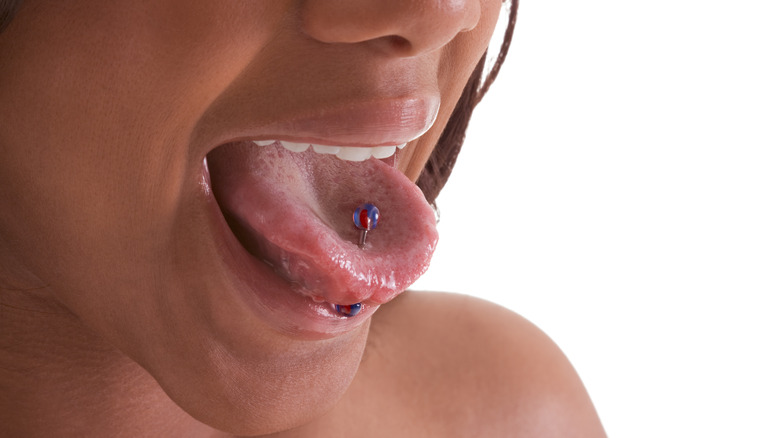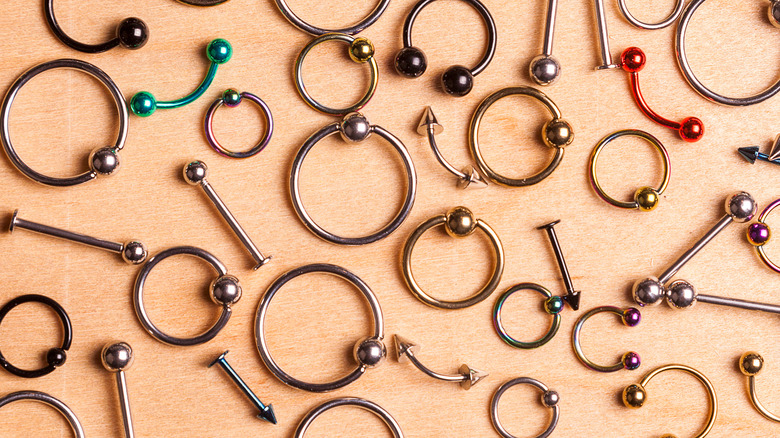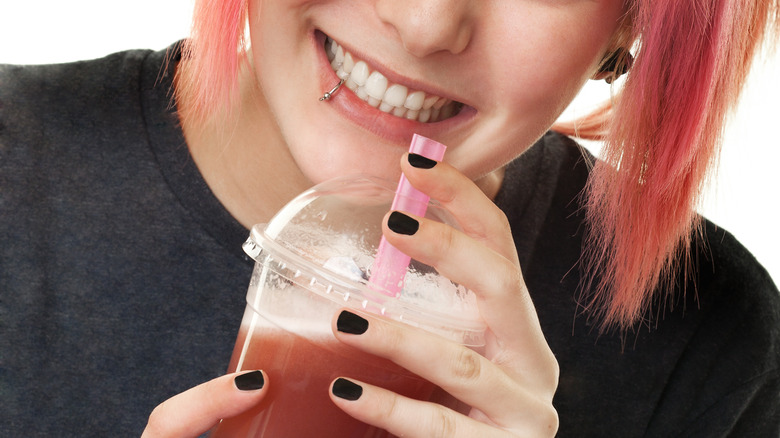How To Properly Take Care Of A New Lip Or Tongue Piercing
For body jewelry fans, perhaps you're looking for something with a little extra flair than the standard ear or belly button piercing. For some people, that answer may be a new mouth piercing. WebMD explains that oral piercings can be split into two categories: intraoral or perioral piercings. In other words, piercings that are either placed internally or externally on the mouth. This includes both lip and tongue piercings.
However, these piercings can pose unique risks to one's health that other piercings do not. According to Fossett D.D.S. General, Cosmetic & Implant Dentistry, oral piercings, particularly tongue piercings, can increase one's risk for blood poisoning, nerve damage, blood clots, gum disease, and more. Additionally, jewelry located in or around the mouth can potentially crack or break while talking, biting, or moving around in your sleep, notes WebMD. Not only can this potentially damage your teeth, but the jewelry then becomes a choking hazard. Most importantly, because our mouth serves as a cozy home for bacteria, oral piercings tend to be more susceptible to infection. Therefore, it's important to know how to care for your new mouth piercing in order to protect yourself against infection. In doing so, you can safely enjoy your new jewelry for years to come.
Methods for cleaning new lip and tongue piercings
In the first few days following a new mouth piercing, it's not unusual to observe some mild bleeding, swelling, or discoloration around the piercing site, notes the Association of Professional Piercers (APP). The healing process of an oral piercing can be deceiving, as the outside skin will mend before the inside of the wound. Therefore, although it may look as if you're in the clear, it's important to keep practicing proper hygiene to keep the piercing clean. Whether your piercing is outside on your lip or inside on your tongue, always start with thorough hand-washing before handling.
For new tongue piercings, be sure to brush and floss regularly, as well as rinse with alcohol-free mouthwash two or more times daily, but without overdoing it (via APP). Using a separate toothbrush, lightly brush the piercing site to keep it void of plaque and bacteria.
It's best to refrain from smoking or vaping following a new oral piercing, as smoking can slow the healing process. If you do, however, just be sure to rinse your mouth with bottled or distilled water afterward, as well as after eating or drinking.
For new lip piercings, rinse them under warm water each day, accompanied by two daily saltwater rinses. Some crust build-up around the jewelry is normal, so just be gentle when removing it before blotting the area dry.
Piercing safety and what not to do
While we've mentioned a number of things that you should do to care for your new mouth piercing, there are also some important things to steer clear of. For instance, the APP cautions against eating hot, acidic, or spicy food items for the first 14 days after a new oral piercing to reduce the chances of irritation. Other things you should avoid chewing on include gum, tobacco, your nails, pencils, or any other physical items, as these increase the risk of bacterial exposure. For this same reason, be sure not to swap kitchen utensils with others while healing. Additionally, some specific actions can increase the likelihood of bleeding or swelling, such as sucking on a straw, so stick to open cups for the time being. Excessive caffeine or alcohol consumption should also be avoided, as well as aspirin use, kissing, or oral sex. Instead, try sleeping with your head propped up at night to help reduce swelling.
To ensure a safe and healthy healing process, make sure your piercer is implementing safe practices, to begin with. First, look for a licensed professional who practices proper hand hygiene, wears disposable gloves, and utilizes sterile instruments (per WebMD). An oral piercing should never be done with a piercing gun, and the jewelry should be made of gold, platinum, or surgical steel. When done safely, and with proper aftercare, your mouth piercing should heal in about three to four weeks' time.



